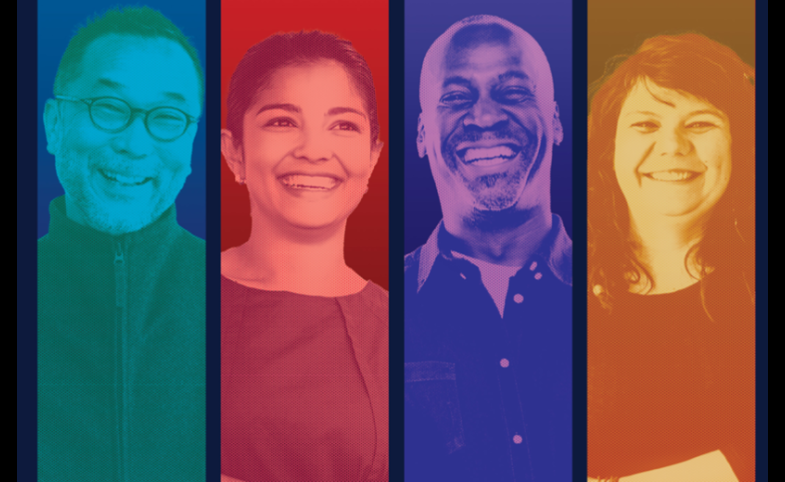Note from the CPD Blog Manager: Neil Simon is vice president of Portland-based Bighorn Communications. He has held public diplomacy leadership roles for the U.S. government and international organizations. He is...
KEEP READINGThe CPD Blog is intended to stimulate dialog among scholars and practitioners from around the world in the public diplomacy sphere. The opinions represented here are the authors' own and do not necessarily reflect CPD's views. For blogger guidelines, click here.

DEIA and Public Diplomacy: Telling the Real Story
Principles of diversity, equity, inclusion and accessibility have long been embedded in USG public diplomacy efforts to “tell America’s story to the World.” But how persuasively have those stories been told? And how have they furthered U.S. foreign policy objectives?
During a December 12, 2023 panel discussion hosted by the U.S. Advisory Commission on Public Diplomacy, Nicholas J. Cull (Professor of Communication, USC Annenberg), Krista Johnson (Director Center for African Studies, Howard University), C. Brian Williams (Founder and Director, Step Afrika! Dance Company), and Yolonda Kerney (Public Affairs Officer, U.S. Department of State) tackled these questions from policy and practitioner perspectives, basing their remarks on a recent ACPD special report assessing public diplomacy and DEIA promotion.
Panelists first considered why DEIA matters in the global arena. The answer, they concluded, has to do with national reputation. A country’s inability to address its domestic political, social, and economic inequities can become a strategic vulnerability in the foreign policy arena, especially when its actions appear to contradict its stated values. Historically, the USG’s mixed record in addressing issues such as racial discrimination and gender inequity has been handily exploited by its geostrategic competitors, to include China and Russia.
Ultimately the real story of America’s long-standing effort to promote diversity and tolerance at home serves both as a cautionary tale of struggle, and a source of inspiration.
Panelists next addressed the need to resist the temptation to elide or gloss over the significant challenges in redressing the wrongs of discrimination and intolerance. The external promotion of the domestic DEIA experience programming must be based in “humility and honesty.” As Cull noted, “no one country has an unblemished record” when it comes to issues of diversity and tolerance, nor does it have “absolute insight” when judging the failures of others.
That’s why the most important step in the promotion of DEIA is open acknowledgment of ongoing challenges, followed by an account of efforts made to address them. The panel agreed with Cull that “unless we are doing the right thing within our societies, we're not going to convince anybody internationally.”
Of course, it is not enough to inject humility and candor into the discussion of current efforts to rectify inequities in diversity, tolerance, and inclusion. We must acknowledge their historical antecedents. Moreover, as Johnson argued, diplomats and scholars must avoid the trap of depicting race and racism in America as an “aberrational artifact of the past,” rather than as actual, ongoing challenges that “lie at the heart of the American project.”
Panelists also emphasized the danger of perpetuating what Johnson described as “the legacies of our biased frames of reference,” making a compelling case for showcasing America’s “wildly diverse” and “demographically rich” communities to frame underlying messaging about diversity and inclusion.
The panelists observed that DEIA principles must be modeled by those who engage in the promotion of American culture and values abroad. As Cull noted, “a foreign service, and the country which it represents, must always remember the importance of walking the walk of diversity, equity, and inclusion if it wishes to be admired” in the foreign policy arena.
Furthermore, although the effort to create democratic spaces for marginalized communities has been an essential component of USG foreign policy initiatives, there are often disconnects between the views of the USG and other countries on issues of race, religion, ethnicity, or the toleration of difference.
And, as the ACPD special report indicated, these disconnects can result in tradeoffs between USG values projection and foreign policy goals. Effective navigation of the local cultural context is essential to the success of DEIA promotion.
Finally, panelists recognized the importance of acknowledging that not all values will resonate. As Kerney commented, in some countries, when it comes to issues of gender equality or respect for LGBTQI+ rights, "we simply are not always going to agree.” However, that should not “stop us from making sure that people are safe,” or from “demonstrating respect for that difference of opinion. Sometimes that is the victory.”
In addition to a contextually modulated approach to the promotion of DEIA principles, panelists agreed that empowering local voices and actors to make the case for diversity, equity, and inclusion is perhaps the best way to ensure a shared commitment to these principles.
Instead of focusing exclusively on compelling content for direct influence activities, public diplomacy practitioners should be focusing on empowering others to make the connection with audiences, especially when it comes to DEIA promotion.
Ultimately the real story of America’s long-standing effort to promote diversity and tolerance at home serves both as a cautionary tale of struggle, and a source of inspiration. Public diplomacy professionals are on the front lines of the effort to convey both.
Visit CPD's Online Library
Explore CPD's vast online database featuring the latest books, articles, speeches and information on international organizations dedicated to public diplomacy.
POPULAR ARTICLES
-
January 29
-
January 20
-
January 28
-
February 6
-
January 8
Join the Conversation
Interested in contributing to the CPD Blog? We welcome your posts. Read our guidelines and find out how you can submit blogs and photo essays >.













